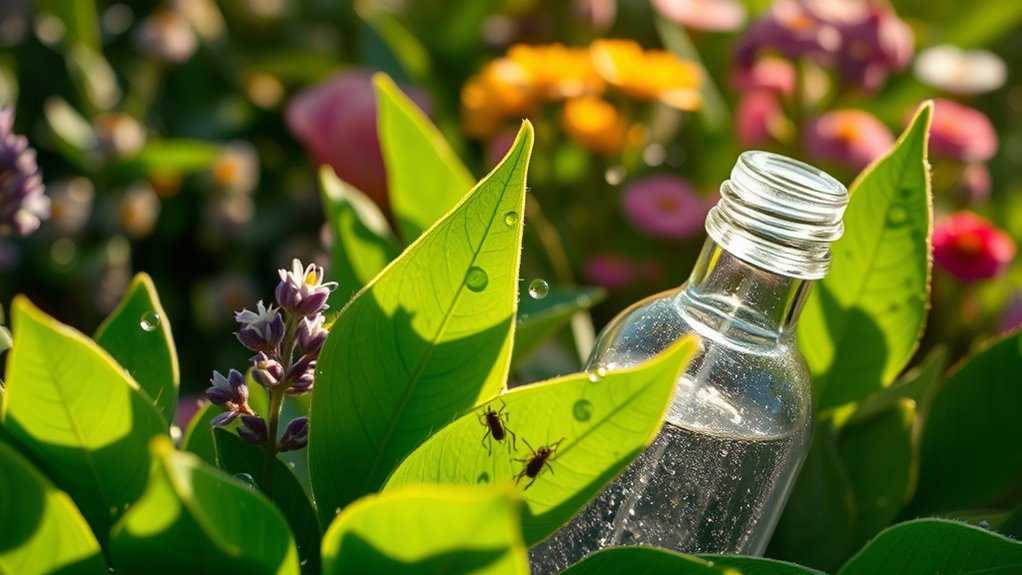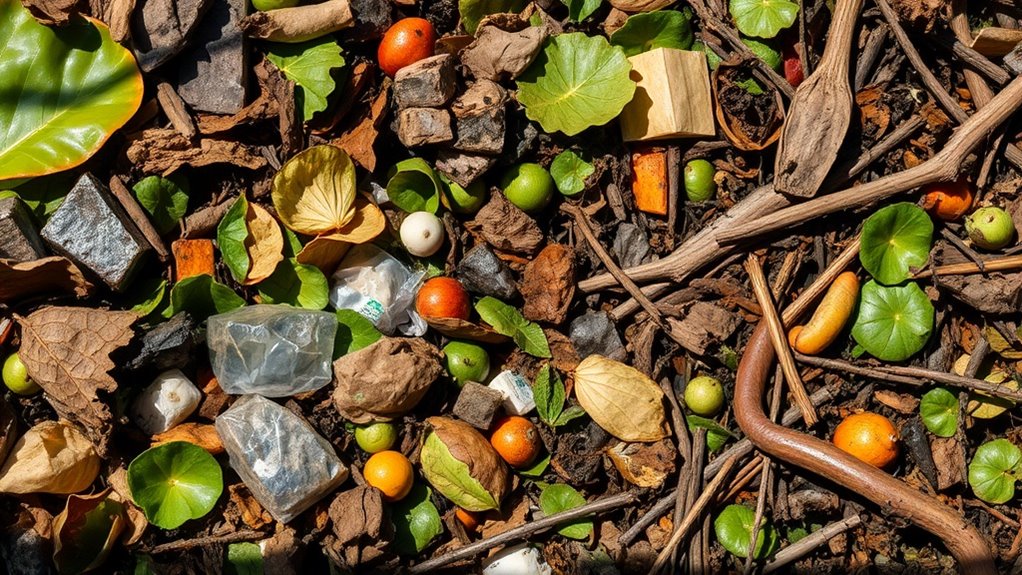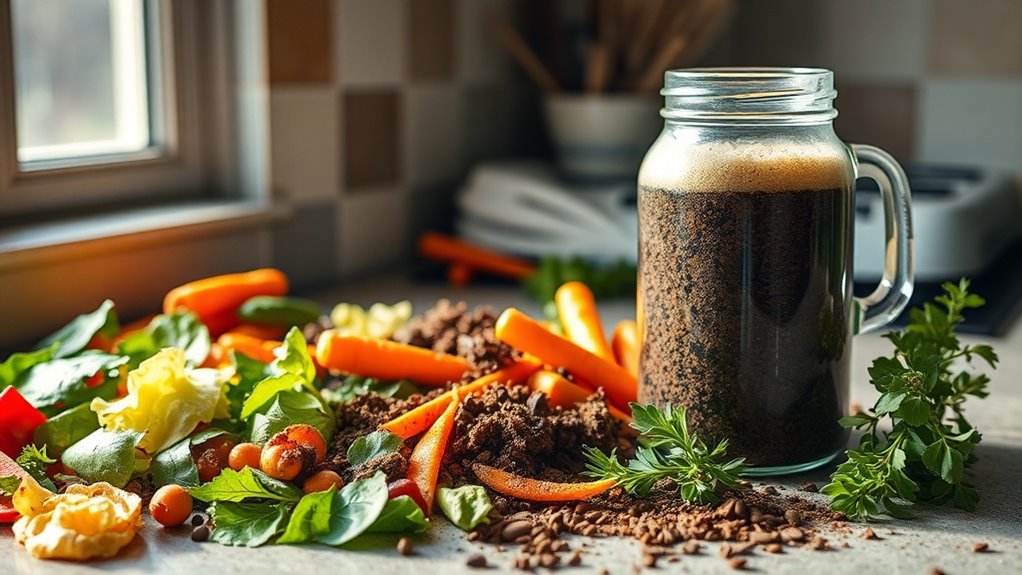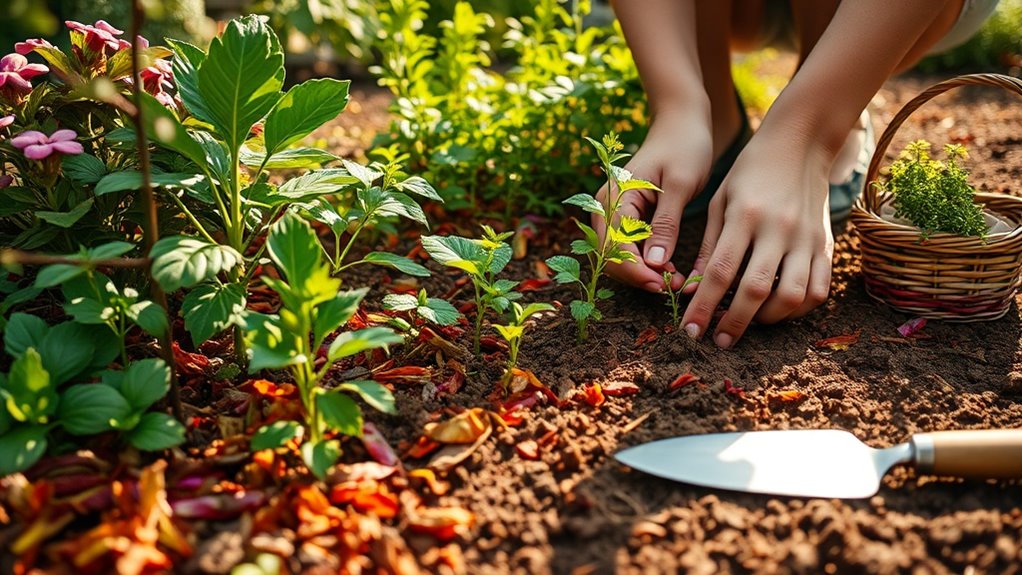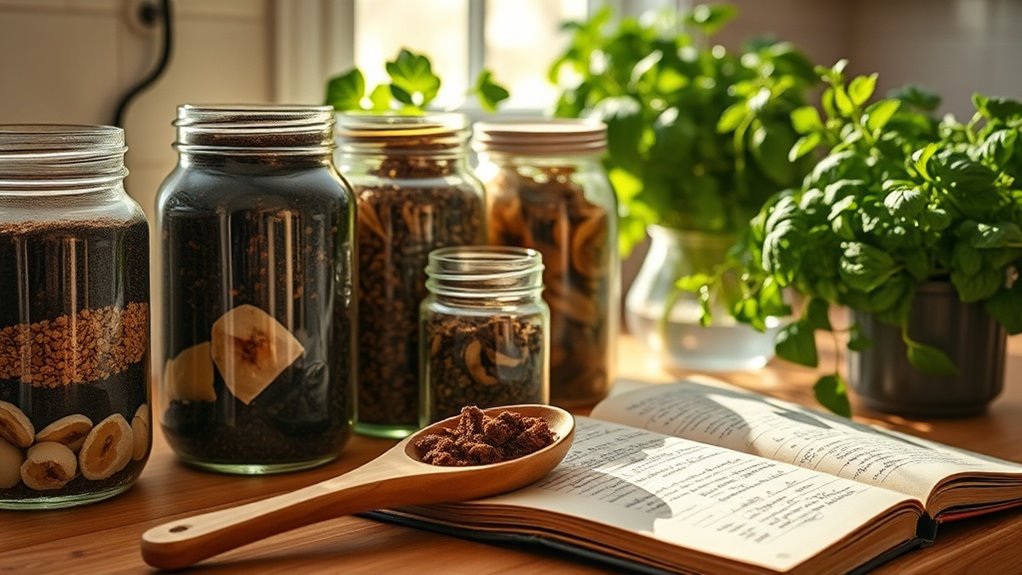Best Natural Sprays to Keep Aphids and Pests Away
Aphids and garden pests can wreak havoc on your plants, but you don’t have to resort to harsh chemicals to keep them at bay. Natural sprays, like neem oil and garlic, are effective and safe for beneficial insects. By understanding how these solutions work, you can create a healthier garden environment. Let’s explore the different options available and find the best methods to protect your plants effectively.
Key Takeaways
- Neem oil spray disrupts pests’ life cycles and is safe for beneficial insects when applied correctly.
- Soap and water solution suffocates pests by disrupting their outer layer; reapply regularly for effectiveness.
- Garlic spray, rich in allicin, naturally repels pests; apply generously, especially on the undersides of leaves.
- Chili pepper spray deters pests with its heat; apply during cooler times of day for maximum effect.
- Essential oil blends with plant-based insecticidal soap are effective and non-toxic, breaking down quickly in the environment.
Neem Oil Spray
Neem oil spray is a powerful natural pesticide derived from the seeds of the neem tree, known for its effectiveness against a variety of pests, including aphids.
This natural bug spray is ideal for your garden, as it disrupts the life cycle of pests without harming beneficial insects when applied correctly.
To use it, mix neem oil with water and a few drops of mild soap for better emulsification.
Spray directly onto affected plants, ensuring thorough coverage of both upper and lower leaf surfaces.
Regular applications can protect your garden, promoting healthier plants and reducing pest populations naturally. Additionally, neem oil works by disrupting the life cycle of pests, making it a highly effective solution for sustainable gardening.
Soap and Water Solution
A simple yet effective solution for managing aphids and other garden pests is a soap and water mixture.
To create this solution, mix one to two tablespoons of liquid dish soap with a quart of water in a spray bottle.
The soap disrupts the pest’s outer layer, making it difficult for them to breathe.
Be sure to apply the mixture directly to affected plants, focusing on the undersides of leaves where pests often hide.
Test a small area first to ensure your plants tolerate the solution.
Reapply every few days or after rain for optimal results in pest control. Additionally, this method is favored by many gardeners because it is a natural pest control alternative that avoids harmful chemicals.
Garlic Spray
Garlic spray serves as a powerful natural deterrent against aphids and various garden pests.
To create your own, blend several cloves of garlic with water and strain the mixture.
This infusion contains allicin, a compound known for its pest-repelling properties.
Diluting the garlic solution with water ensures it won’t harm your plants.
Spray it generously on affected foliage, focusing on the undersides of leaves where pests often hide.
Reapply weekly or after rain for maximum effectiveness.
Not only does garlic spray repel pests, but it’s also safe for beneficial insects, making it an eco-friendly choice for your garden. Additionally, natural pest sprays can enhance your gardening efforts by keeping harmful insects at bay.
Chili Pepper Spray
Chili pepper spray is an effective natural remedy for deterring aphids and other pests.
To create your own spray, you’ll need fresh chili peppers, water, and a few drops of dish soap.
Once you have your ingredients ready, you’ll want to apply the spray early in the morning or late in the afternoon for the best results. Additionally, this spray acts as a safe and eco-friendly pest control solution, helping to protect your garden without harmful chemicals.
Recipe Ingredients Needed
To create an effective chili pepper spray for deterring aphids and other pests, you’ll need a few key ingredients.
Start with two tablespoons of crushed chili peppers or a few fresh, chopped peppers.
Combine this with two cups of water to create a potent mixture.
For added effectiveness, include a teaspoon of liquid soap, which helps the spray adhere to plant surfaces.
You might also consider adding a tablespoon of vegetable oil to enhance the spray’s sticking power.
After gathering these ingredients, you’ll be ready to mix them together and prepare your homemade pest deterrent.
Application Tips Effective
Once you’ve prepared your chili pepper spray, proper application is key to maximizing its effectiveness against aphids and other pests. Aim to spray during the early morning or late afternoon to avoid direct sunlight, which can reduce potency. Ensure even coverage on both sides of leaves, as pests often hide there.
| Step | Action | Notes |
|---|---|---|
| 1 | Shake the spray well | Mixes ingredients evenly |
| 2 | Spray on affected plants | Focus on infested areas |
| 3 | Reapply weekly | Maintains effectiveness |
| 4 | Monitor for pest resurgence | Adjust application as needed |
Essential Oil Blend
Essential oils like neem, peppermint, and rosemary can effectively combat aphids and other pests in your garden.
To create a powerful essential oil blend, you’ll need to mix these oils with a carrier such as water or witch hazel, following specific ratios for optimal results. Additionally, using natural pest control methods can help maintain a healthy garden ecosystem. This guide will provide you with the exact mixing instructions to ensure your homemade spray is both potent and safe for your plants.
Effective Essential Oils
Have you considered harnessing the power of essential oils as a natural defense against aphids and other pests? Certain oils, like neem, peppermint, and lavender, possess potent insect-repelling properties.
Neem oil disrupts the life cycle of pests, while peppermint oil acts as an effective deterrent due to its strong scent.
Lavender oil not only repels insects but also provides a pleasant aroma.
Additionally, tea tree oil contains antimicrobial properties that can protect your plants from infections.
Mixing Instructions Guide
Using effective essential oils to combat aphids and other pests is just the beginning; knowing how to mix them properly can enhance their efficacy.
Start with a base of 1 cup of water, adding 1 tablespoon of liquid soap, which helps emulsify the oils.
Then, incorporate 10-15 drops of your chosen essential oils, such as peppermint, neem, or citrus oils.
Shake the mixture thoroughly before each use to ensure even distribution.
Test on a small plant section first, checking for any adverse reactions.
Store the blend in a dark glass spray bottle to preserve its potency and effectiveness.
Plant-Based Insecticidal Soap
Plant-based insecticidal soap offers an effective and eco-friendly solution for managing aphids and other common garden pests. This soap works by suffocating insects, disrupting their cell membranes. It’s safe for most plants and beneficial insects when applied correctly. Additionally, this type of soap is part of an effective organic pest mix that emphasizes sustainable gardening practices.
| Usage Tips | Benefits |
|---|---|
| Apply in the morning | Non-toxic to pets and humans |
| Test on a small area | Breaks down quickly in the environment |
| Use a fine mist | Effective against a range of pests |
| Repeat every 5-7 days | Cost-effective solution |

